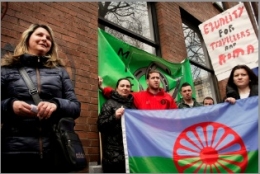Roma flags and protest banners saying ‘Stop the Persecution’ were the order of the day in front of the European Union’s representation in the Irish capital on 8 April.
The demonstration, organised by Roma and Traveller activist group Minciérs Whiden, was intended to promote Traveller culture and to protest recent acts of discrimination in honour of International Romani Day.
“Today is a special day,” said Hugh Friel of the Donegal Travellers Project who joined the protest on the day. “Many groups promoting the Traveller and Roma culture have come together today to support the cause.”
Among those groups supporting Minciérs Whiden to mark International Romani Day were Pavee Point, the Irish Travellers Movement and the National Women’s Council of Ireland.
Jim O’Brien of Minciérs Whiden spoke at the rally to outline many of the problems experienced by the Traveller and Roma communities in Ireland.
“Travellers have the lowest life expectancy and the highest infant mortality rate in Ireland,” he said, adding that “the suicide rate is seven times higher among Traveller and Roma youth than indigenous Irish.”
This low standard of living is often believed to be a result of the racial discrimination and persecution that Travellers face on a daily basis.
“We manage our own language, customs and traditions,” said O’Brien. “We are a people who love our families, value our history and our culture. But the Traveller culture is constantly under attack.”
O’Brien and Friel both referenced several remarks made by members of the Dáil, judges and other politicians that they described as “racist”, with O’Brien going as far to say that “hatred has caused a chain reaction” resulting, he alleges, in hate crime against Travellers – particularly one incident in February in which a home was burned down in an arson attack in Donegal.
Amnesty International has also called upon the Government “to use the EU presidency to work for better protections for Roma communities across the continent,” according to a recent statement.
“Across Europe, Roma and Travellers are discriminated against in all walks of life, ” said Colm O’Gorman, executive director of Amnesty International Ireland. “During the presidency Ireland should aim to coordinate the work of all EU member states on developing National Roma Integration Strategies, ensuring that examples of best practice and effective monitoring can be shared throughout Europe.”
Several EU countries, including Belgium and the UK, have formally recognised the Roma and Traveller communities as an ethnic minority. Minciérs Whiden hopes that by the end of 2013 the Irish Government will also recognise these communities and put an end to the discrimination against Roma and Traveller people.
Justice Minister Alan Shatter also made a statement on International Romani Day referring to the importance of implementing the National Roma Integration Strategies published in 2012.
“The development of these strategies was a major step towards a more inclusive and socially cohesive European Union based on respect for diverse cultural traditions and identities,” said the minister. “Implementing the strategies will ensure that the plight of Roma is properly considered in the four priority areas of education, employment, healthcare and housing.”
Meanwhile, at the rally in front of European Union House in Dawson Street, Monika Makulova of the Roma community sang the Roma national anthem to honour her culture and people, followed by Selina O’Leary’s rendition of the popular ‘Tinker’s Lullaby’.
“We are fighting through persecution,” said Jim O’Brien. “Ireland must face up to our community and support the inclusion and integration of Travellers and Roma.”












